It’s Monday morning. Three key players in your organization are facing unique challenges:
- Sarah, your enablement manager, is staring at a calendar filled with onboarding sessions for new hires, wondering how she’ll scale her efforts to meet the needs of a rapidly growing sales team.
- Meanwhile, Sam, your leading account executive, is preparing for a meeting next week with a potential client in an unfamiliar industry. She’s feeling anxious about her lack of specific knowledge and is scrambling to find relevant information to make a strong impression.
- And then there’s Mike, the sales manager, who’s just reviewed this quarter’s numbers and is desperately seeking ways to improve his team’s performance without taking them out of the field for extended training sessions.
These and similar scenarios exist because traditional training methods don’t address the unique needs of your sales team. In turn, it hurts revenue and employee satisfaction rates. A TalentLMS survey found that 76% of employees would stick around longer if they received more learning and development support from their employers.
Until now, giving sales teams the ongoing support they need while in the field was challenging. But that’s changing fast, thanks to artificial intelligence.
AI tools can prepare, upskill, and allow your sales teams to tap into a network of knowledge in seconds. It’s reimagining what’s possible in sales performance and readiness by improving sales enablement processes, offering personalized learning paths, immersive training experiences, and data-driven insights that turn sales teams into power sellers.
So whether you’re an enablement director looking to scale your efforts, a head of learning and development seeking more effective training methods, or a sales manager wanting to boost your team’s performance, AI can help you get there faster.
Why traditional sales training methods fall short
Not to knock the efforts of training managers, but there’s only so much a human can do. You’re strapped for time and resources, making it difficult to scale your sales operations.
Let’s take a closer look at the issues surrounding traditional sales training:
- Time constraints hold teams back from closing deals while upskilling. For example, if Sarah coaches her ten reps for two hours weekly, that’s 20 hours a week — half her time. Critical tasks like strategic planning suffer, leaving teams ill-prepared to sell new products or meet customer needs.
- Non-standardized learning creates inconsistent customer experiences. Allowing regional managers to customize training can lead to gaps in knowledge. Teams in different locations may excel in various skills, creating inconsistent customer experiences and complicating company-wide strategy rollouts.
- Personalized coaching is non-existent, causing a one-size-fits-none problem. Tailoring coaching to each rep’s strengths is ideal. However, as teams grow — say, from 50 to 500 reps — providing personalized guidance becomes impossible. Without scalable solutions, skill stagnation and poor performance follow.
- Measuring effectiveness is impossible without metrics and data-driven insights. Without reliable data, measuring training effectiveness is challenging. A costly training event may not translate into improved sales, leading to skepticism and reduced investment in future training efforts.
- The forgetting curve — the silent killer of training ROI. Studies show that 70% of training content is forgotten within 30 days without reinforcement. This decay hampers performance at critical moments, leading to missed opportunities and frustrated sales teams.
How AI is upgrading sales training and enablement
Traditions are hard to break. But that’s no reason not to try. Once you see the five ways AI is turning sales teams into better sellers (no matter their skill level), you may be tempted to make a few changes of your own.
1. Using AI-powered coaching to scale learning, training, and onboarding
Traditional sales coaching methods often fall short because of time constraints, subjective feedback, and inconsistent delivery across managers. This leaves sales teams underprepared and lacking confidence in customer interactions.
Without effective coaching, sales reps struggle to retain information, apply their training, and deliver consistent messaging. This leads to longer ramp times for new hires, decreased sales performance, and ultimately, poor buying experiences for customers.
For example, you might have new reps taking months to reach full productivity and seasoned reps struggling to adapt to new product launches or market changes. Managers, overwhelmed with their own targets, can only provide sporadic, inconsistent coaching sessions.
The solution: AI-powered coaching platforms allow managers to create robust, interactive curriculums using existing assets, combining video and text-based assessments with AI analysis.
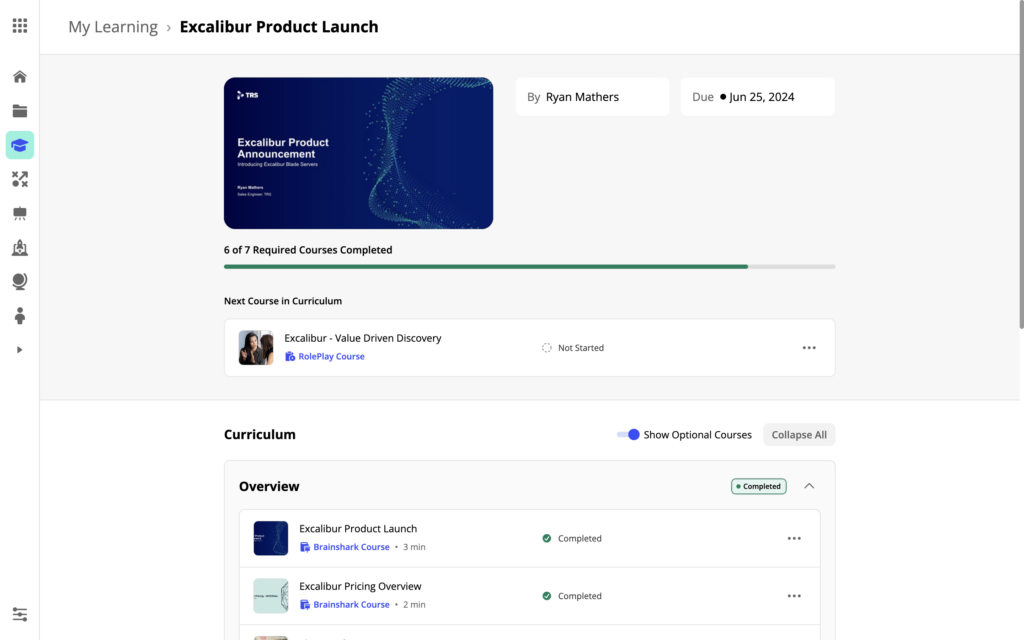
Here’s how it works:
- Content creation: Managers can quickly combine existing assets into dynamic training modules, easily updating information as needed.
- Video and text assessments: Reps submit their pitches, demos, or presentations through video or text, providing a comprehensive view of their skills.
- AI analysis: The system uses AI to analyze submissions, evaluating everything from topic coverage to vocal delivery and tone.
- Instant feedback: Reps receive immediate, objective feedback on their performance, including detailed metrics on vocal delivery and perceived confidence.
- Personalized learning: The AI identifies areas for improvement and suggests targeted training modules, creating personalized learning paths for each rep.
- Practice mode: Reps can record multiple takes in a safe environment, refining their skills before formal submission.
- Manager insights: The system gives managers AI-generated scores, helping them prioritize their coaching efforts and focus on reps who need the most support.
Nothing scales coaching efforts and ensures consistency across the organization like AI and machine learning tools. Reps receive continuous, objective feedback, allowing them to improve at their own pace without constant manager oversight.
Here’s an example of coaching Scorecards in Bigtincan Readiness, which track each rep’s coaching scores and reflect how training correlates to revenue:
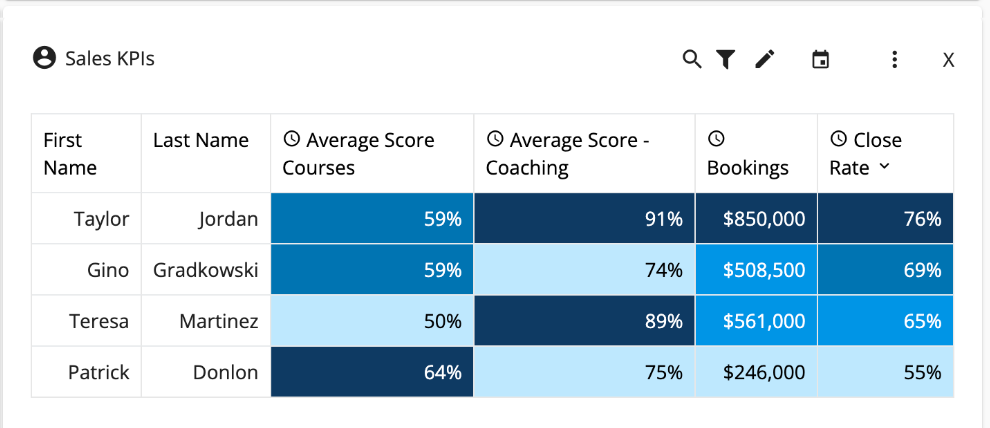
Pro tip: Set up a monthly challenge where reps compete to improve their coaching scores the most. This gamifies the learning process and encourages consistent practice.
2. Conversation Intelligence: Turning casual talk into serious insights
In sales, quality conversation isn’t cheap — it’s gold. But for years, it’s been slipping through our fingers, lost in the ether of countless calls and meetings. That’s changing for companies using Conversation Intelligence to turn everyday sales chatter into pure, actionable insights.
*Rod Serling voice* Submitted for your approval is Jake, a seasoned sales manager, used to spend hours listening to call recordings, trying to piece together why some reps consistently outperformed others. To be real, he rarely got the full picture, which meant days and weeks of his life wasted.
With Conversation Intelligence, Jake now has a bird’s-eye view of his team’s interactions with prospects.
But the AI doesn’t just transcribe calls — it analyzes them. It picks up on patterns that the human ear might miss. For instance, it noticed that top performers spent 60% of their time listening rather than talking. Who knew silence could be so golden?
But it doesn’t stop there. AI provides personalized recommendations for each rep. Like Sasha, a new team member, was struggling with technical questions. The AI flagged this and suggested specific product knowledge training modules.
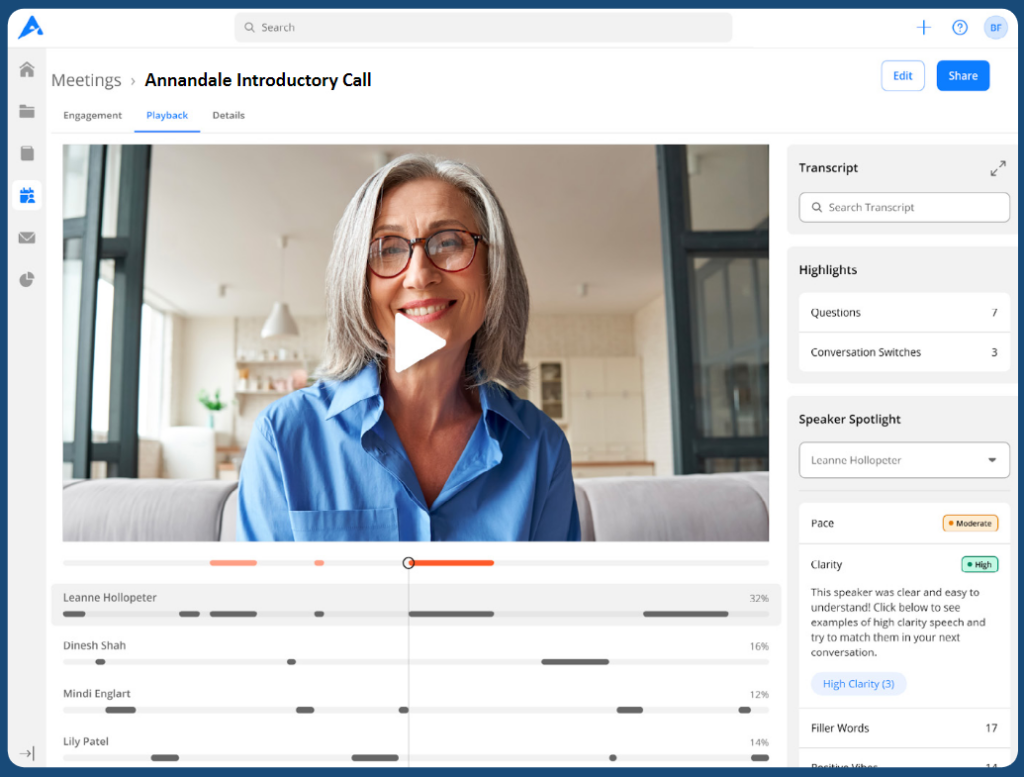
With Conversation Intelligence, you’re not just improving individual performance. Reps learn from each other’s successes (and failures), managers can provide targeted coaching, and the whole team is always on the same page.
Pro tip: Create a “greatest hits” playlist. Compile snippets of calls where reps handled tough objections brilliantly or closed deals with finesse. It’s like a highlight reel for your sales team, and trust me, they’ll eat it up.
3. Roleplaying with AI: Practice makes perfect
Remember the old saying, “Practice makes perfect”? In sales, it’s more like “Perfect practice makes perfect performance.” But who has time for perfect practice when you’re juggling quotas, client meetings, and a never-ending inbox?
With AI, salespeople can get the coaching they need whenever they need it without eating into company resources.
Say John is a new sales rep at a fast-growing SaaS company. It’s 10 PM, and he’s preparing for a big pitch tomorrow. Instead of frantically rehearsing in front of a bathroom mirror, he fires up the AI coaching tool. Within minutes, he’s involved in a lifelike conversation with an AI that’s playing the role of a skeptical CFO. As John navigates the virtual meeting, the AI throws curveballs his way — unexpected objections, last-minute stakeholder additions, you name it.
Then, after each practice session, John receives instant, objective feedback. The AI analyzes everything from his tone and pace to her word choice and even the structure of her argument. No more waiting for his busy manager to find time for a coaching session.
Best of all, there’s no embarrassment. AI coaching creates a safe space for failure. With AI, John can bomb in private, learn from his mistakes, and try again…and again…and again. There’s no judgment, no awkward silences, just focused improvement.
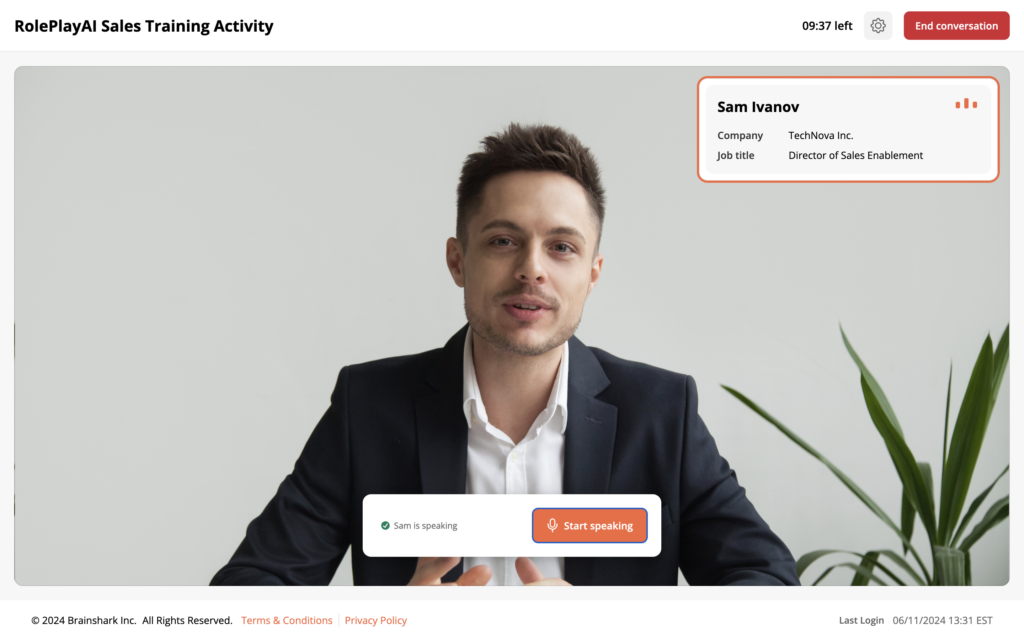
Pro tip: Use RolePlayAI to create your toughest sales scenarios library. Had a deal fall through because of a tricky objection? Turn it into an AI coaching module. This way, your team can learn from each other’s experiences, scaling your collective knowledge across the organization.
4. Microlearning and just-in-time training with AI
Salespeople need to be out in the field as much as possible. So who has time for day-long training sessions? Yet, you need to keep your people updated on changing market trends, product launches, and so on.
With AI, you can introduce microlearning and just-in-time training to keep your sales team sharp, agile, and always ready.
For example, Danielle, one of your top reps, is about to walk into a crucial meeting. She needs a quick refresher on handling a specific objection. Instead of frantically searching through lengthy training materials, she pulls out her phone, asks the AI assistant, and gets a bite-sized, personalized refresher in seconds. That’s AI-driven just-in-time learning in action.
Here’s what else it can offer:
- Bite-sized content: AI breaks down complex training materials into digestible chunks. We’re talking 3-5 minute videos, quick quizzes, or interactive infographics.
- Contextual recommendations: AI doesn’t just serve up random content. It analyzes the rep’s upcoming meetings, recent performance, and even CRM data to suggest the most relevant microlearning modules.
- Spaced repetition: Remember the forgetting curve we talked about earlier? AI practice tools like coaching and roleplay AI help combat this through snackable periodic reinforcement of key concepts. It’s like having a personal trainer for your brain, keeping those sales muscles toned.
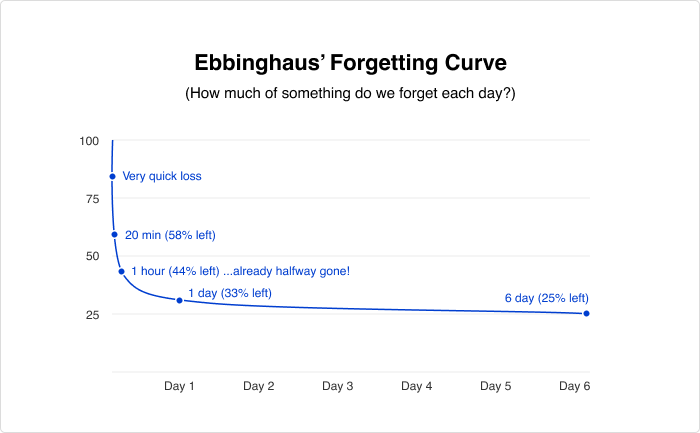
The AI doesn’t just wait for scheduled learning sessions. It proactively pushes relevant content when it’s most needed:
- Lost a deal to a specific competitor? The AI serves up a quick competitive analysis module.
- Noticed a dip in your demo-to-close ratio? Here’s a rapid-fire series on improving demo techniques.
- Preparing for a major product launch? The AI gathers all of the top content to consume about the new product’s features, benefits, and competitive positioning.
Pro tip: Use AI automation to create “learning playlists” for different sales scenarios. Going into a negotiation? Here’s a curated list of quick tips and roleplay exercises to get you in the zone.
5. Personalized learning paths to sharpen your salespeople’s skills
There’s no excuse for cookie-cutter coaching and learning when you have AI at your disposal.
It creates personalized learning paths so every sales rep gets a tailor-made journey based on their strengths and skill gaps.
Let’s take Rebecca, a seasoned rep who’s the G.O.A.T. at closing but struggles with technical product details. And, Jake, the new guy, who can recite product specs in his sleep but freezes up during negotiations. Traditionally, they’d both sit through the same generic training sessions.
But with AI-driven learning paths? You’ll have a personal sales coach for every rep on your team.
The AI doesn’t just assign random modules — it constantly analyzes performance data and call recordings, and even CRM interactions.
So for Rebecca, the AI may serve a series of bite-sized product deep-dives, perfectly timed before her next big tech-heavy pitch. Jake, on the other hand, may find himself immersed in negotiation simulations, each slightly more challenging than the last.
Pro tip: Use your CRM data to enhance your AI learning paths. Did a rep just lose a deal to a specific competitor? The AI can quickly source relevant battle cards and competitive training modules.
Making AI less intimidating to your sales teams
Even the best tech can flop if your team doesn’t embrace it. Here’s how to ensure your AI implementation sticks:
- Start small: Begin with a pilot program. Choose a subset of your team to test the waters and provide feedback.
- Show, don’t tell: Use real examples of how AI can make their jobs easier. Nothing sells like results.
- Gamify the experience: Turn adoption into a friendly competition. Who can complete the most AI-powered training modules this month?
- Continuous feedback loop: Regularly check in with users. What’s working? What’s not? Use this feedback to refine your approach.
And let’s not overlook a pressing concern — resistance to AI. Here’s how to respond to AI objections:
- Fear of job replacement: Emphasize that AI is here to augment, not replace. Show how it frees up time for high-value activities.
- Learning curve concerns: Provide ample training and support. Consider appointing “AI Champions” within each team to help others.
- Data privacy worries: Be transparent about data usage and security measures. Choose AI tools with strong privacy credentials.
Remember, implementing AI in your sales enablement strategy isn’t just about technology – it’s about creating the most empowered, confident, and effective sales team out there.
Make sales coaching as dynamic as your customers
In some industries, product updates are as frequent as every few months. The same is true for the changing needs of your customers. And staying on top of it all can be tough for your salespeople who are neck deep in calls with customers and have little time to get up to speed.
By embracing AI in your sales enablement strategy, you’re not just keeping up with the times. You’re creating a sales force that’s more knowledgeable and adaptable.
Want to learn more about using AI to build better sales teams? Check out our guide on how AI-powered coaching improves your sellers’ pitch and presence on customer calls.
